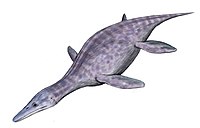牛津黏土组
| 牛津黏土组 地层年代:侏罗纪中期至晚期(卡洛夫阶至牛津阶), | |
|---|---|
 韦茅斯附近的海岸露出的牛津黏土组 | |
| 类型 | 组 |
| 属于 | 安康姆群 |
| 包含 | 彼得伯勒段(英语:Peterborough Member)、史都华拜段(英语:Stewartby Member)、韦茅斯段(英语:Weymouth Member) |
| 上覆 | 西华顿层、科罗利亚群 |
| 下伏 | 凯拉威斯层、奥斯卡拜层 |
| 厚度 | 可达185米,在东密德兰薛尔夫平均为50至70米 |
| 岩性 | |
| 主要 | 黏土岩 |
| 次要 | 泥岩 |
| 地点 | |
| 取名自 | 牛津 |
| 地区 | 牛津、 彼得伯勒、 多塞特郡、 约克郡 |
| 国家 | |
牛津黏土组(英语:Oxford Clay 或 Oxford Clay Formation)是一个英国的侏罗纪海洋沉积岩组,大部分位于东南英格兰,西至多塞特郡,北至约克郡。牛津黏土组的年代约为侏罗纪中晚期的卡洛夫阶至牛津阶 [1],该层包含两种主要的岩相 (地质),下层为彼得伯勒段(英语:Peterborough Member),其为一富含化石及有机物的泥岩。该岩相及其岩层通常被称为下牛津黏土组,岩相上段则有中牛津黏土组的史都华拜段(英语:Stewartby Member)及上牛津黏土组的韦茅斯段(英语:Weymouth Member)。上段岩相缺乏化石且充满钙化的泥岩。
牛津黏土组出现在牛津、彼得伯勒及韦茅斯的地表上,并在这些地区的多处采石场发现。下牛津黏土组顶端发现有发生岩性的改变,其由易碎的页岩转变为灰色的泥岩。中及上牛津黏土组有些微的不同,由一道位于南密德兰的泥质石灰岩将两段分隔。
古生物学
[编辑]牛津黏土组最为著名的是其富含大量的鱼类及无脊椎动物化石。许多化石被保存完好,偶尔会发现化石完整度极高的个体。生活在牛津泥海的动物包括蛇颈龙目、中喙鳄科、鱼龙目、头足纲(如箭石目)、双壳纲及多种的腹足纲。恐龙蛋也在下牛津黏土组中被发现,他们位于英格兰剑桥郡。
鸟臀目
[编辑]不明的欧洲鸟脚下目恐龙被发现在下牛津黏土组,位于英格兰剑桥郡。
| 牛津黏土组的鸟臀目成员 | ||||||
|---|---|---|---|---|---|---|
| 属 | 种 | 发现地点 | 地层位置 | 发现部位 | 备注 | 图片 |
|
卡洛夫龙 |
利氏卡洛夫龙[2] |
|
下段[2] |
“股骨”[3] |
  | |
|
堡垒勒苏维斯龙[5] |
下段[5] |
|||||
|
Indeterminate[7] |
|
|||||
|
原始铠甲龙[2] |
|
下段[2] |
||||
|
利氏窃肉龙 |
|
下段[2] |
“部分下颌骨”[9] |
|||
蜥臀目
[编辑]| 牛津黏土组的蜥臀目成员 | ||||||
|---|---|---|---|---|---|---|
| 属 | 种 | 发现地点 | 地层位置 | 发现部位 | 备注 | 图片 |
|
史氏似鲸龙[2] |
|
下段[2] |
“半个骨架”[10] |
   | ||
|
牛津美扭椎龙[11] |
|
上段[11] |
不相连的头骨和骨架,可能还有四肢碎片[12] |
|||
|
未定[13] |
在剑桥郡发现的尾椎骨曾被Upchurch跟Martin(2003)错认为是“利氏鸟面龙”合模标本同系列[14] | |||||
|
未定[11] |
|
中段[11] |
||||
|
中棘龙 |
派氏中棘龙 M. parkeri |
|
上段 | |||
蛇颈龙目
[编辑]| 属 | 种 | 发现地点 | 地层位置 | 发现部位 | 备注 | 图片 |
|---|---|---|---|---|---|---|
|
浅隐龙 |
宽股浅隐龙 |
     | ||||
|
里氏浅隐龙 |
浅隐龙科 | |||||
|
滑齿龙 |
残酷滑齿龙 |
|||||
|
粗颈滑齿龙 |
海猎龙类上龙科 | |||||
|
大理石泳龙 |
坎氏大理石泳龙 |
上龙科 | ||||
|
海鳗龙 |
利氏海鳗龙 |
浅隐龙科 | ||||
|
厚肋龙 |
道氏厚肋龙 |
上龙科 | ||||
|
泥泳龙 |
菲氏泥泳龙 |
海猎龙类上龙科 | ||||
|
尖锁龙 |
箭锁尖锁龙 |
浅隐龙科 | ||||
|
上龙 |
安氏上龙 |
海猎龙类上龙科,代表一个不同于上龙的新属 | ||||
|
扁鼻强龙 |
贪食扁鼻强龙 |
海猎龙类上龙科 | ||||
|
三锁龙 |
丝氏三锁龙 |
浅隐龙科 |
厚茎鱼目
[编辑]| 属 | 种 | 发现地点 | 地层位置 | 发现部位 | 备注 | 图片 |
|---|---|---|---|---|---|---|
| 利兹鱼 Leedsichthys |
困惑利兹鱼 L. problematicus |
巨型滤食性厚茎鱼目 | ||||
|
马提尔鱼 |
瑞氏马提尔鱼 |
滤食性厚茎鱼目 | ||||
|
“高茎鱼” |
“宽吻高茎鱼” |
肉食性厚茎鱼目,与高茎鱼无关,是直茎鱼的近亲 |
海鳄亚目
[编辑]*红色表重新分类
| 属 | 种 | 发现地点 | 地层位置 | 发现部位 | 备注 | 图片 |
|---|---|---|---|---|---|---|
|
雷米鳄 |
钝齿雷米鳄 |
    | ||||
|
优雅鳄 |
利氏优雅鳄 |
斗蜥鳄科真蜥鳄科 | ||||
|
狭蜥鳄 |
爱氏狭蜥鳄 |
现被归类为新狭蜥鳄 | ||||
|
堡垒狭蜥鳄 |
爱氏新狭蜥鳄的次异名 | |||||
|
新狭蜥鳄 |
爱氏新狭蜥鳄 |
斗蜥鳄科真蜥鳄科 | ||||
|
神秘鳄属 |
利氏神秘鳄 |
|||||
|
中喙鳄 |
上层中喙鳄 |
该物种现被归类为一个新属“海鳄属”[15] | ||||
|
海鳄 |
上层海鳄 |
|||||
|
纤泳鳄 |
利氏纤泳鳄 |
中喙鳄亚科中喙鳄科 | ||||
|
鳄齿鳄 |
短吻鳄齿鳄 |
地蜥鳄亚科中喙鳄科 | ||||
|
堡垒鳄齿鳄 |
地蜥鳄亚科中喙鳄科 | |||||
|
嗜血暴泳鳄 |
地蜥鳄亚科中喙鳄科 |
经济利用
[编辑]牛津黏土组的土质透气且柔软,经常被用来铺路,也是伦敦大部分建筑所使用的傅莱顿砖偷的来源。于制砖来看,牛津黏土组具有含碳量高的优势,碳提供的燃烧所需的部分燃料,从而减少了对外部燃料的需求。
参考文献
[编辑]- ^ Oxford Clay Formation. The BGS Lexicon of Named Rock Units. British Geological Survey. [21 August 2017]. (原始内容存档于2018-07-17).
- ^ 2.00 2.01 2.02 2.03 2.04 2.05 2.06 2.07 2.08 2.09 2.10 2.11 2.12 2.13 2.14 2.15 2.16 "10.9 Cambridgeshire, England; 1. Lower Oxford Clay," in Weishampel, et al. (2004). Page 540.
- ^ "Table 18.1," in Weishampel, et al. (2004). Page 396.
- ^ Weishampel, et al. (2004). Pages 539-540.
- ^ 5.0 5.1 "10.7 Dorset, England; 3. Lower Oxford Clay" and "cambridgeshire">"10.9 Cambridgeshire, England; 1. Lower Oxford Clay," in Weishampel, et al. (2004). Pages 539-540.
- ^ "10.7 Dorset, England; 3. Lower Oxford Clay," in Weishampel, et al. (2004). Page 539.
- ^ Listed as "?Lexovisaurus sp." in "10.10 Bedfordshire, England; 1. Oxford Clay," in Weishampel, et al. (2004). Page 540.
- ^ "10.10 Bedfordshire, England; 1. Oxford Clay," in Weishampel, et al. (2004). Page 540.
- ^ "Table 17.1," in Weishampel, et al. (2004). Page 367.
- ^ "Table 13.1," in Weishampel, et al. (2004). Page 265.
- ^ 11.0 11.1 11.2 11.3 11.4 11.5 11.6 "10.14 Oxfordshire, England; 8. Middle Oxford Clay," in Weishampel, et al. (2004). Page 540.
- ^ "Table 4.1," in Weishampel, et al. (2004). Page 72.
- ^ 13.0 13.1 "10.14 Wiltshire, England; 4. Oxford Clay," in Weishampel, et al. (2004). Page 540.
- ^ Noé LF, Liston JJ, Chapman SD. 2010. ‘Old bones, dry subject’: the dinosaurs and pterosaur collected by Alfred Nicholson Leeds of Peterborough, England. Geological Society, London, Special Publications 343: 49–77.
- ^ Young, M.T.; Brignon, A.; Sachs, S.; Hornung, J.; Foffa, D.; Kitson, J.J.N.; Johnson, M.M.; Steel, L. Cutting the Gordian knot: a historical and taxonomic revision of the Jurassic crocodylomorph Metriorhynchus. Zoological Journal of the Linnean Society. 2021, 192 (2): 510–553 [2021-06-28]. doi:10.1093/zoolinnean/zlaa092. (原始内容存档于2020-11-06).
- ^ Mark T. Young; Marco Brandalise de Andrade; Stephen L. Brusatte; Manabu Sakamoto; Jeff Liston. The oldest known metriorhynchid super-predator: a new genus and species from the Middle Jurassic of England, with implications for serration and mandibular evolution in predacious clades. Journal of Systematic Palaeontology. 2013, 11 (4): 475–513. doi:10.1080/14772019.2012.704948.
延伸阅读
[编辑]- Andrews, C. W. 1910. "A Descriptive Catalogue of the Marine Reptiles of the Oxford Clay, Part I". British Museum (Natural History), London, England: 205 pp.
- Andrews, CW. 1913. A descriptive catalogue of the Marine Reptiles of the Oxford Clay, Part II. British Museum (Natural History). pp. 205pp.
- M. J. Benton and P. S. Spencer. 1995. Fossil Reptiles of Great Britain. Chapman & Hall, London 1-386
- J. B. Delair. 1973. The dinosaurs of Wiltshire. The Wiltshire Archaeological and Natural History Magazine 68:1-7
- P. M. Galton. 1980. European Jurassic ornithopod dinosaurs of the families Hypsilophodontidae and Camptosauridae. Neues Jahrbuch für Geologie und Paläontologie, Abhandlungen 160(1):73-95
- D. M. Martill. 1988. A review of the terrestrial vertebrate of fossils of the Oxford Clay (Callovian-Oxfordian) of England. Mercian Geologist 11(3):171-190
